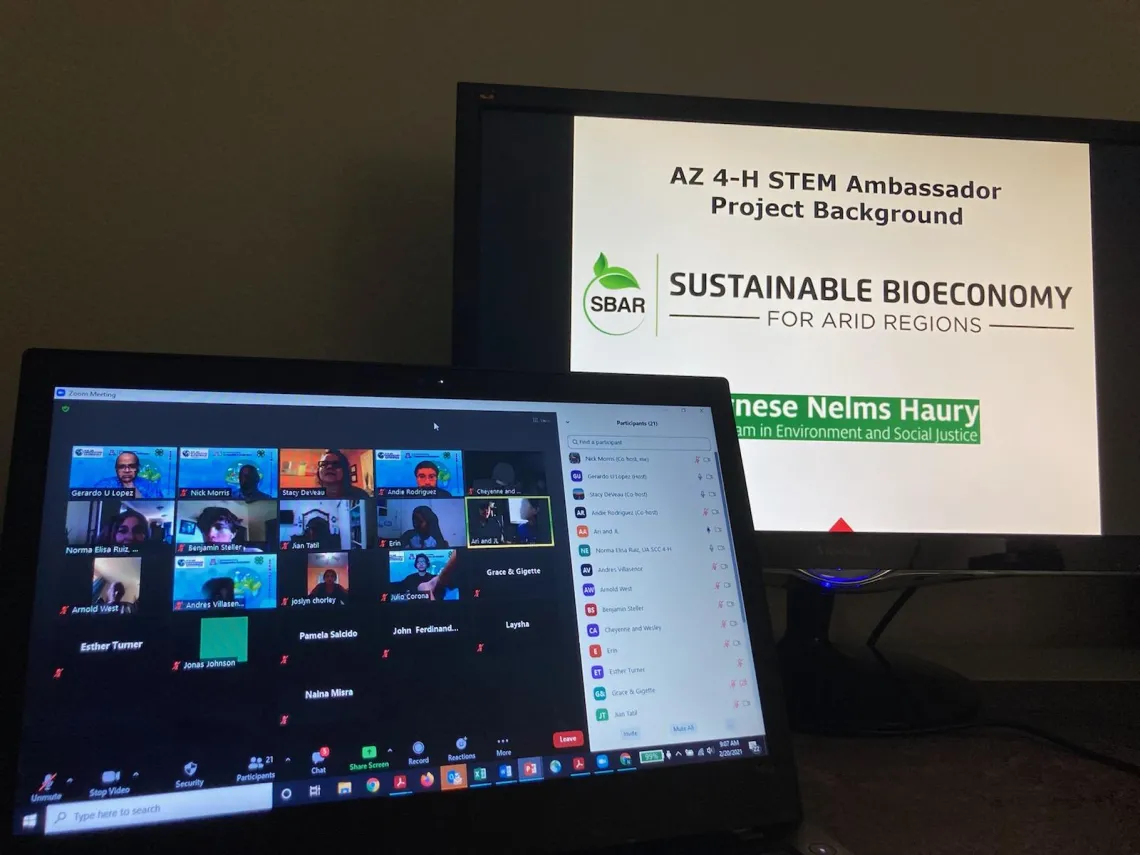A stellar example is the SBAR – Arizona 4-H partnership
Together, we can and must do more. We also can and must do more together.

Excerpt from the Agnese Nelms Haury Program Newsletter - 2/16/2021
Through its education pipeline, the Haury Program invests in educational programs that deliver project-based learning activities that are culturally relevant to students' backgrounds. One stellar example is the SBAR – Arizona 4-H partnership. The three-pronged partnership is led by Alix Rogstad, Sustainable Bioeconomy for Arid Regions (SBAR) Center of Excellence, Nick Morris, Arizona 4-H STEM, and Kimberly Ogden, College of Engineering. SBAR aims to establish programs to build youth agency through STEM skills and content that may usher in a more sustainable future in rural Arizona. The programs stress the importance of cultural awareness and its impact on sustainability strategies' success. Of central importance is the value of local and traditional knowledge within tribal and rural communities.
Arizona 4-H is creating curricula for sustainable bioeconomy in partnership with New Mexico State University and Tribal Communities
A key component of the SBAR and Arizona 4-H partnership is the modification of curricula developed during the first three years of the SBAR project to apply to 4-H contexts where they can better serve youth in rural, Spanish-speaking and tribal communities.
Since 2019, teachers from New Mexico State University (NMSU) have worked with SBAR to deliver an afterschool program called “Guardians of the Biosphere.” Nick Morris, Arizona 4-H program specialist and SBAR youth development lead, works with SBAR Fellow Jacob Usrey and Drs. Catie Brewer and Maryfrances Miller to adapt the program for use as a 4-H project curriculum. The program's goal is to expose traditional 4-H youth to the concept of bioeconomy. Once complete, the curriculum will be published through NMSU and available for New Mexico and Arizona 4-H programs.
Morris is working with a team of 4-H staff from Pima, Maricopa, and Coconino Counties as well as the San Carlos Apache, Navajo Nation, and Hualapai tribal communities. Their shared effort is to create an afterschool special interest club (SPIN) curriculum focused on historical, current, and future stories of ecology, culture, and agriculture in arid lands. The lessons will feature hands-on learning and role-play problem-solving.
This curriculum provides the opportunity for students to learn the history of agriculture from tribal and Hispanic perspectives. These perspectives challenge the traditional European view and increase awareness about culture’s contributions. All content will be assessed for cultural relevancy based on a Peoplehood Model tool now in the testing phase of development with a 4-H team of tribal and non-tribal members. They seek to ensure that the activities and experiences in 4-H are culturally relevant.
In other focus areas, the STEM ambassador program is set to roll out from February 20 – April 3. STEM ambassadors will receive training on ambassador toolkits that contain presentation tools and materials aligned with AZ 4-H STEM YOUniversity content, guidance on engagement planning and communication skills, evaluation, and introduction to Youth Participatory Action Research. We anticipate a diverse cohort of 15-20 youth participants, including Indigenous and rural Hispanic students in this pilot STEM Ambassador training program in February.
Plans for 2021 include launching a youth internship program focusing on tribal and rural youth wherein 4-H senior youth will have the opportunity to intern with STEM-oriented professionals to learn more about the application of STEM in the workforce. 4-H is founded on quality youth and adult relationships that promote positive youth development. “The internship program is a natural fit for our youth, and we look forward to placing them with great role models in their communities,” says Morris.
Program lead Nick Morris stated, “It has been a pleasure to work with both the AZ 4-H STEM team and the SBAR experts to develop meaningful program options for volunteers and youth across Arizona”.
The SBAR - AZ 4-H partnership enhances the Haury Program partnerships with the New Mexico State University. Morris states “We are strategically working with our partners at NMSU, so the New Mexico 4-H youth and volunteers benefit from the programs created here.” Reciprocally, as the youth development team members in New Mexico develop curricula and programs for Future Farmers of America (FFA), those resources will be shared with Arizona FFA.

